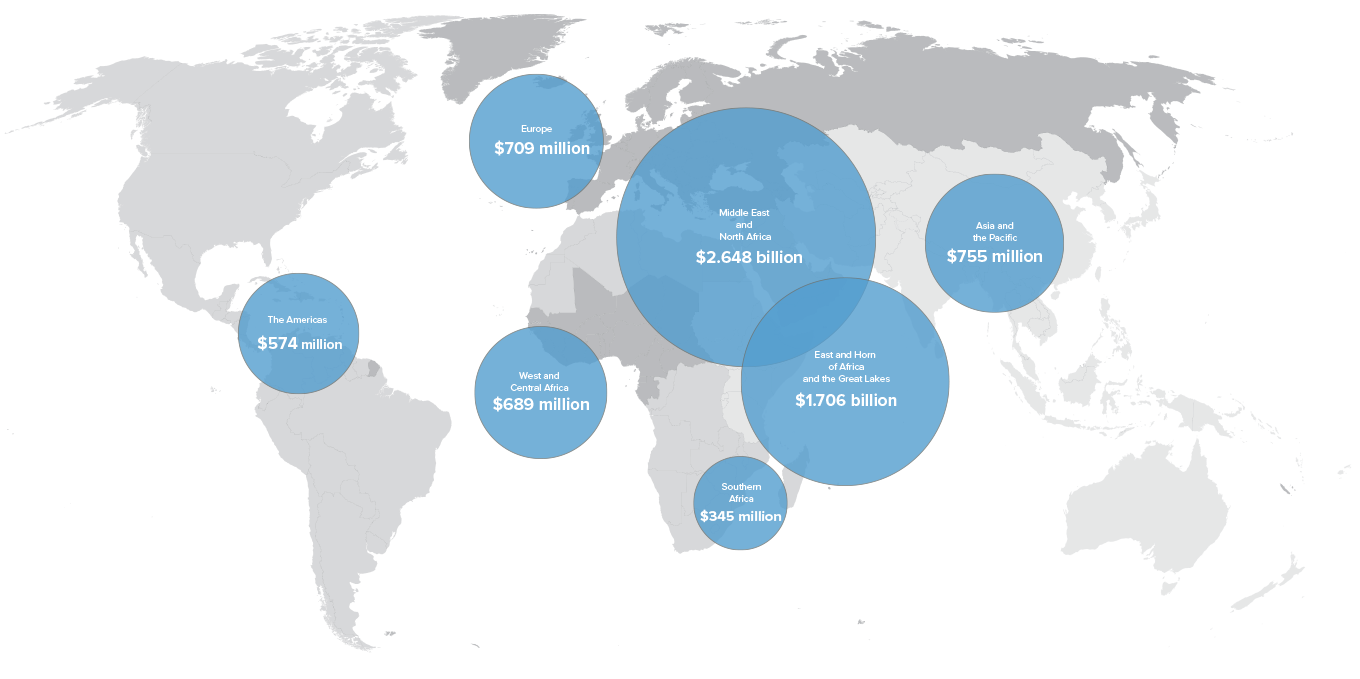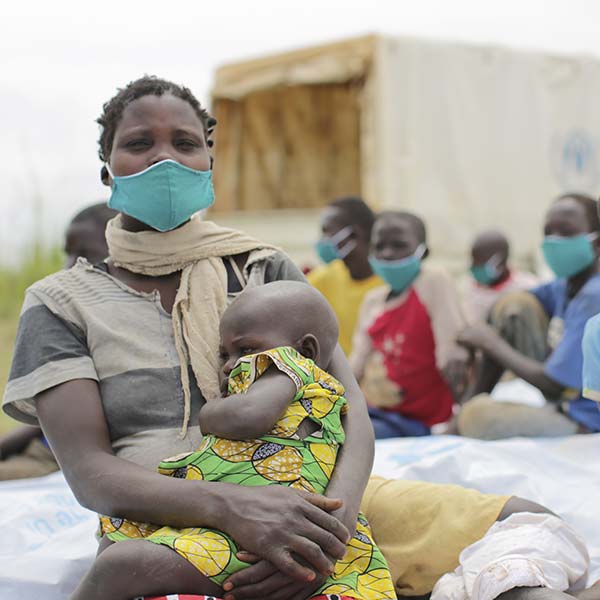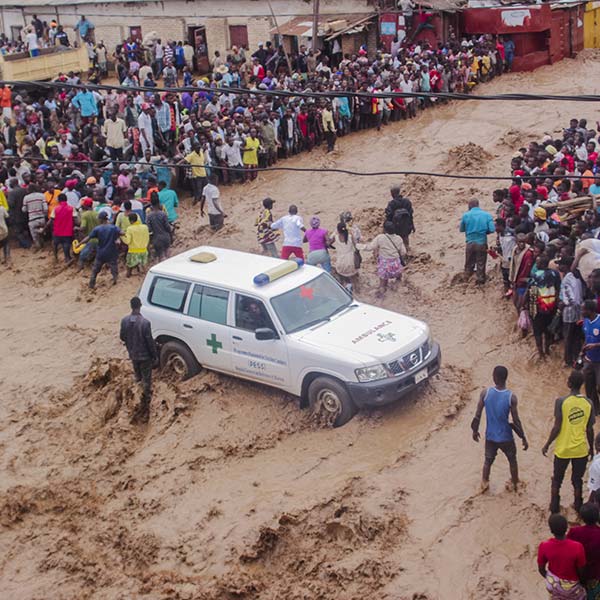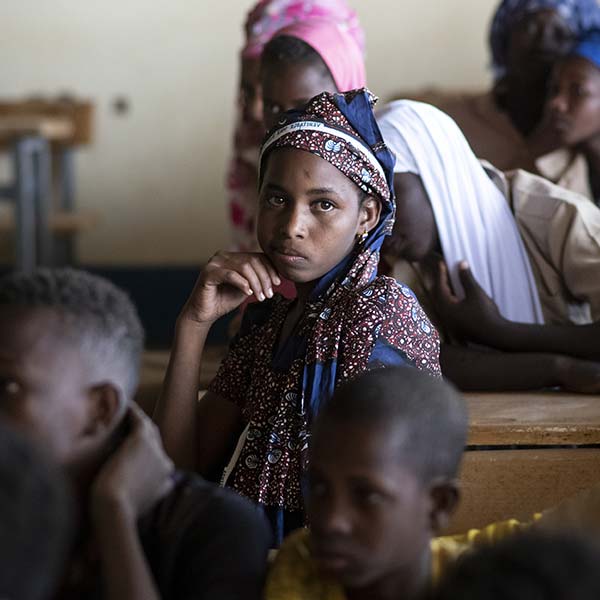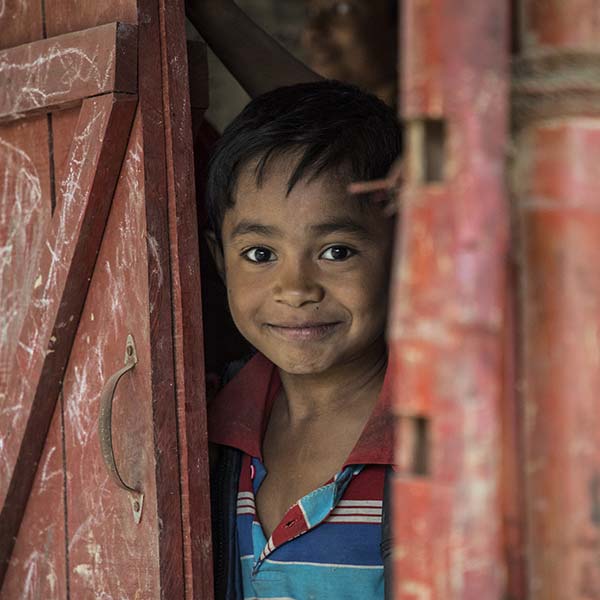A more recent edition of the Appeal has been released. View the latest Appeal
UNHCR’s first-ever Youth with Refugees Art Contest was launched in April 2020 amid the COVID-19 pandemic, to encourage young people aged 12-25, to reflect creatively on the theme: “Everyone counts in the fight against the virus, including refugees.” Some 2,000 participants from 100 countries submitted drawings and comic strips. Mr. Alfa Mukange, 25, a Congolese refugee in Kenya, is one of the global winners. © UNHCR/Alfa
As this tumultuous year comes to a close, UNHCR is looking ahead at how to address the challenges of 2021 and beyond. The COVID-19 pandemic has affected countries throughout the world, threatening people’s health and livelihoods while compounding challenges faced by the 80 million people forcibly displaced in the world today. These men, women and children cannot be forgotten and we cannot allow the pandemic to distract from meeting their urgent needs while searching for solutions to their plight.
UNHCR appeals in the strongest terms for those with means to continue to support the humanitarian response around the world. Now is the time to demonstrate international solidarity with the most vulnerable, to save lives, reduce suffering, improve conditions and expand opportunities for refugees, IDPs, stateless persons, and their hosts, so that they can realize their potential.
The 2021 Global Appeal Update provides information for governments, host countries, private donors, and other partners about the Office’s priorities and budgeted activities to achieve these goals in the coming year.
UNHCR
in 2021
Two young refugees from Afghanistan hold hands in an informal camp adjacent to the Moria reception and identification centre on Lesbos, Greece. © UNHCR/Achilleas Zavallis
To fulfill its mandated responsibilities
UNHCR requires
to support an anticipated
PEOPLE OF CONCERN*
in
COUNTRIES AND TERRITORIES
* While the population figures for 2019—which show some 80 million forcibly displaced people—reflect verified, statistics, those for 2020 and 2021 are planning figures. These figures are based on the anticipated evolution of situations during the planning year, and take into account the current population size, the average population growth, expected movements, as well as changes in the status of people of concern to UNHCR.
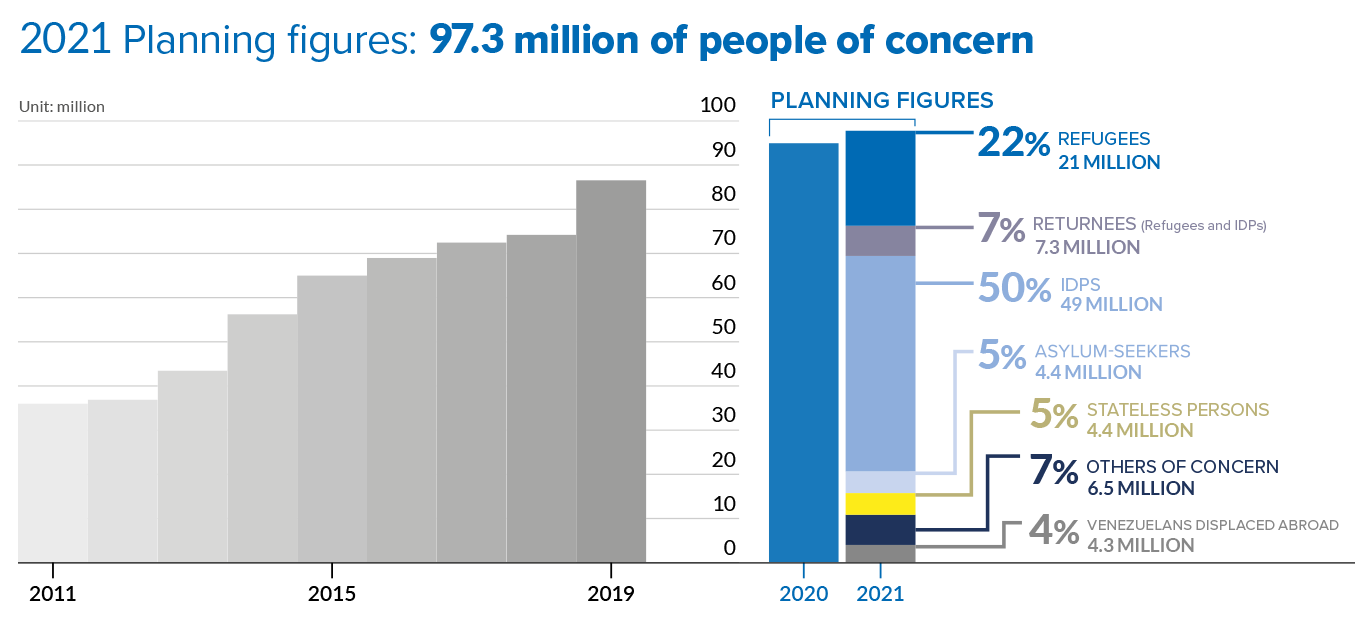
The needs continue to grow
80 MILLION
people are forcibly displaced in the world.
24 MILLION
children around the world have been driven across borders by conflict and violence.
4.2 MILLION
people are known to be stateless.
COVID-19
has exacerbated the risks of gender-based violence for women and girls, highlighting existing inequalities and discrimination.
85% OF REFUGEES
are hosted in low-and middle-income countries, where health systems are often overstretched.
2 MILLION
refugee children and youth are out of school as a result of mandatory school closures due to COVID-19.
74%
of refugees can only meet half or less of their basic needs.
46%
reduction in the number of refugees who were able to voluntarily repatriate by the end of 2019, as compared to 2018.
1.4 MILLION
refugees will be in need of resettlement in 2021.
Populations of concern to UNHCR
A record 97.3 million people are anticipated to be of concern to the Office in 2021.
In response to new, protracted or worsening crises generating greater needs, UNHCR’s 2021 needs-based budget will amount to $8.616 billion.
Global initiatives in 2021
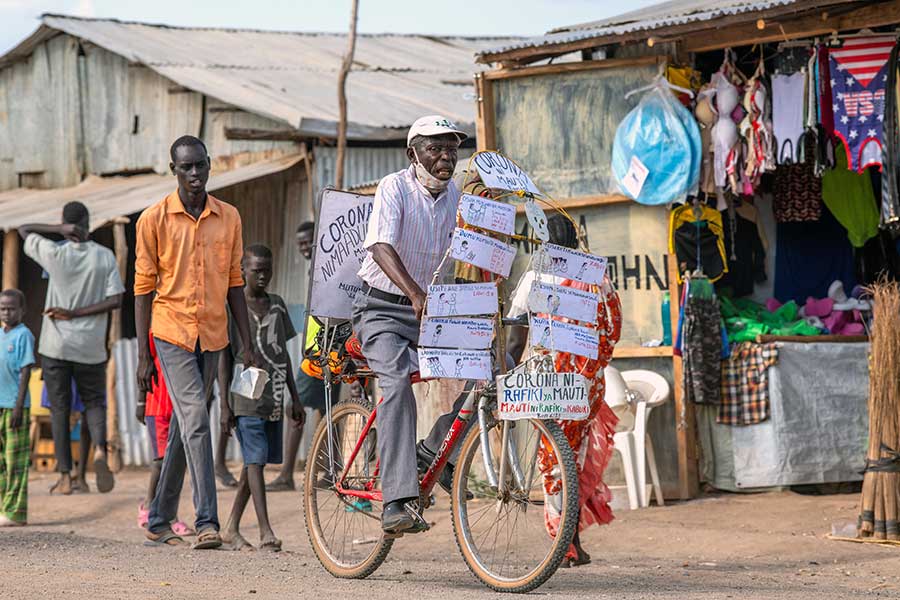
The COVID-19 pandemic
Despite decades of experience, the coronavirus emergency has been unlike any seen throughout UNHCR’s 70-year history. Never has every UNHCR office and operation faced a crisis of this magnitude—all at the same time. UNHCR anticipates that considerable and sustained investment will be needed in 2021 to respond to the effects of the global pandemic on people of concern. Emerging priority areas for the coming year will include primary and secondary health care, protection, cash assistance, livelihoods and education.
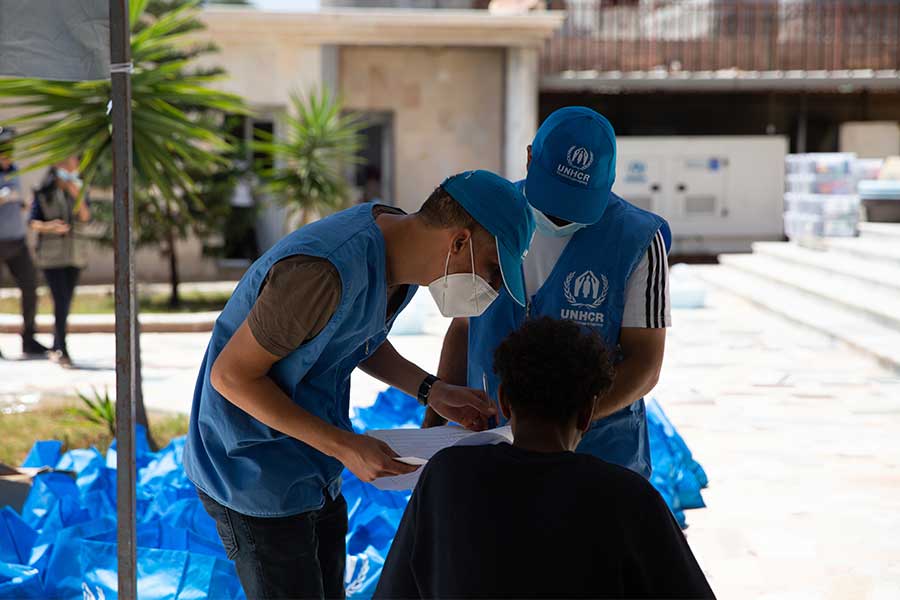
UNHCR’s engagement in situations of internal displacement
Sudden and slow-onset disasters triggered 9.8 million new internal displacements in the first half of 2020. UNHCR will continue to roll out its IDP Policy and strengthen its response to IDP situations in 2021, guided by certain key commitments, including ensuring the centrality of protection, resilience and solutions; better data; and well-resourced coordination leadership.

UNHCR’s climate action in 2021
The impacts of climate change disproportionately affect the world’s most vulnerable people, with refugees and IDPs often hosted in “climate hotspots” or regions being rendered increasingly uninhabitable. Climate change can also drive new displacement and create barriers to return. Climate change and its effects are of both legal and operational relevance to UNHCR’s work, leading the Office to step up its climate action under three strategic pillars: legal and normative work on behalf of the displaced, minimizing the environmental impacts of large-scale displacement, and improving UNHCR’s own environment footprint.
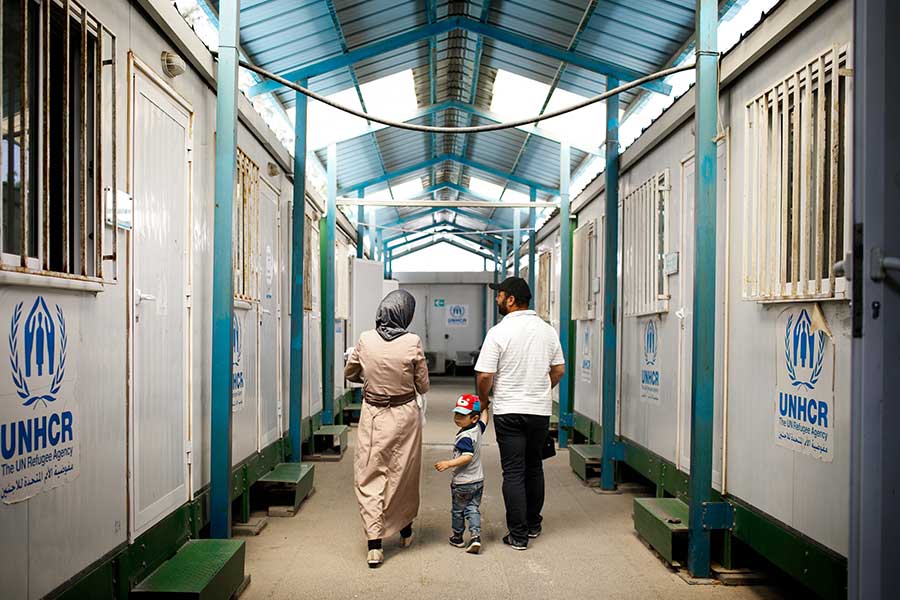
The Global Compact on Refugees
The international community has continued to mobilize support for the achievement of the Compact’s four objectives and, despite the COVID-19 pandemic, the implementation of the 1,400 pledges made by governments and other stakeholders at the 2019 Global Refugee Forum is progressing well. The continued political commitment to the Global Compact in 2021 is impressive in the lead up to the first High-Level Official’s Meeting in December 2021, with the Compact’s central principle of solidarity more relevant than ever.
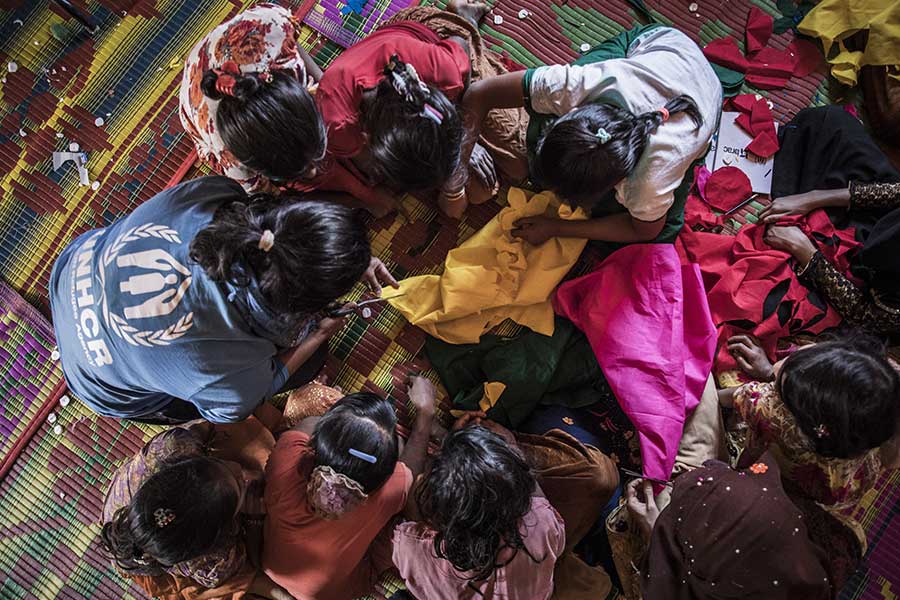
Partnerships
In 2021, UNHCR will strengthen its work with partners to advance protection and solutions, including by furthering collaboration with development, peace and security actors. The ongoing NGO partnership reform process is expected to result in simplified agreements in 2021, leaving more room for strategic discussions and engagement. A new framework for UNHCR’s work with refugee-led organizations and networks will also be developed, and particular focus will be placed on relationships with faith-based actors and women-led civil society organizations.
Planned results
A young asylum-seeker from Afghanistan attends class near the Vial reception and identification centre on Chios, Greece. ©UNHCR/Achilleas Zavallis
Over the year, with the support of host countries, committed donors, and other partners, UNHCR will work to safeguard fundamental rights, provide life-saving support and build better futures for millions of refugees, returnees, internally displaced people and stateless persons.
Safeguard fundamental rights
Registration
19 million individual records will be registered in UNHCR’s population registration and identity management ecosystem (PRIMES).
Statelessness
90,000 stateless persons will be supported to acquire a nationality, or have it confirmed.
Child protection
70% or more of unaccompanied or separated children will have a best interests process initiated or completed.
Community-based protection
85% of UNHCR operations will have functioning complaints and feedback mechanisms in place, including in the context of responses to COVID-19.
Respond with life-saving support
Cash assistance
$700 million in cash assistance will be provided to people of concern across 95 operations.
Health
(including mental health and psychosocial support)
40% of refugee-hosting countries with national health insurance schemes will include refugees on the same basis as nationals.
180,000 consultations will be provided for mental, neurological and substance use conditions in refugee health facilities.
Water, hygiene and sanitation
45% of people of concern will have access to at least 20 litres of safe water per day.
Shelter and settlement
An estimated 4.75 million people of concern will be targeted with shelter assistance in 2021.
Build
better futures
Education
2 million children will be enrolled in primary education.
500,000 refugee children and youth will be supported with distance or home-based learning in the context of the COVID-19 pandemic.
Livelihoods and economic inclusion
50% of people of concern aged 15 or older will hold a basic financial account (a mobile money account or an account with a financial institution).
Energy and environmental protection
2.9 million refugees and other people of concern will have access to sustainable sources of electricity.
Resettlement
80,000 refugees will be resettled through UNHCR.
To all donors—governmental and private—UNHCR extends its most sincere thanks for your support in 2020 and the year to come.
A Syrian refugee plays with his little daughter on the rooftop of their house in Barja, Lebanon.
© UNHCR/Diego Ibarra Sánchez
For more information visit the
Global Focus website
Learn more about how UNHCR’s work in 2021 will impact the lives of millions of refugees, asylum-seekers, returnees, internally displaced and stateless persons by reading UNHCR’s Global Appeal 2021 Update or visiting the Global Focus website.


